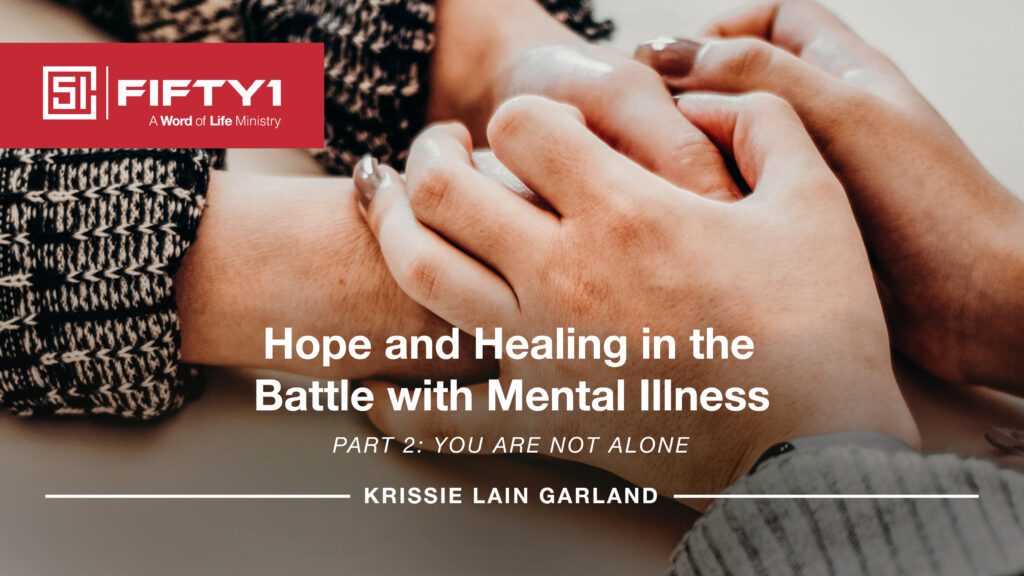PART 2: You Are Not Alone
In the first part of this post, we defined mental health and discussed just how prevalent the mental health struggle is in our world (if you haven’t read Part One, you can access it HERE). An important truth to remember is that those who struggle are not alone in their fight. We see several biblical examples of faith-filled characters who struggled mightily with emotional and mental pain.
For example, Job’s suffering was perhaps one of the most tragic experiences for a man of God to face. This suffering was through no fault of his own. Here are a few examples of mental and emotional pain in his life:
Job experienced deep sorrow and depression. In Job 3:11, Job said, “Why did I not die at birth, come out from the womb and expire?” Later in the same chapter, Job also said, “I am not at ease, nor am I quiet; I have no rest, but trouble comes” (v. 26).
In Job 10:1, Job stated “I loathe my life; I will give free utterance to my complaint; I will speak in the bitterness of my soul.” Finally, in Job 30:15-17, he says: “Terrors are turned upon me … my soul is poured out within me; days of affliction have taken hold of me. The night racks my bones, and the pain that gnaws me takes no rest.”
Now, this is not the end of the story. The Lord did restore to Job what was lost, and much more. However, these few verses clearly indicate that Job (at least for a season) struggled with what we know as depression.
Elijah is another example of one who showed signs of despair—to the point that he prayed to die. “It is enough,” he said in 1 Kings 19:4. “Now, O Lord, take away my life, for I am no better than my fathers.” The Lord did minister to Elijah, and the rest of the story is an amazing recovery for the prophet.
David had a heart after God, and yet experienced years of trauma. When he finally became king of Israel, he fought many battles and won many victories for the Lord. There were some terrible moments in David’s life. David gave clues in the Psalms that he often struggled with depression. For example, he wrote in Psalm 38:6 and 8, “I am utterly bowed down and prostrate; all the day I go about mourning … I groan because of the tumult of my heart.” He also wrote in Psalm 42:5 and 43:2a, “Why are you cast down, O my soul, and why are you in turmoil within me? Hope in God; for I shall again praise him, my salvation … For you are the God in whom I take refuge.” David repented of his sin, and God surely helped him all the days of his life.
The examples continue throughout the New Testament as well. These men in Scripture show us that real human emotion, mental distress, and internal anguish within the heart, soul, and mind are true human experiences. They also show us that faith can exist along with mental, emotional, and physical struggles in the life of a believer.
There is one distinguishing truth we have as Christians that so many have not acquired—it is a personal relationship with Jesus Christ. David describes it well in Psalm 94:19; “When the cares of my heart are many, your consolations cheer my soul.” We have hope, the promise of His presence, and the peace that joy will come.
It’s important that we remember this, and that we also understand that mental illness is not solely derived from a spiritual sickness. There can also be mental, emotional, and physical components. If someone is struggling, it could be situational. Or, it could be a clinical disorder, meaning that something is physically going on within the brain. Battling mental illness can change a brain’s structure, chemistry, and function. When seeking help and healing from mental and emotional pain, it is important to remember that mental illness is a disease that cannot be controlled or prayed away in all circumstances. We must give grace to ourselves and to our brothers and sisters who are struggling in this battle.
How can we shift this conversation away from social stigmas to create a culture of compassion for those who struggle with mental health issues?
1. Accept that mental illness is not solely a spiritual issue and that it can affect anyone.
2. Know that God provides us with help and hope in our suffering.
Often, God uses the body of Christ to provide this help and hope. The Bible has all the answers that we need as a believer. It is the inerrant Word of God. Everything in it is true. The Bible provides answers, hope, and strength. Yet, we must also know that God gives us resources to utilize as well—doctors, Christian counselors, and sometimes medicine. This is an important message for the church to understand and teach.
3. The church should be on the frontlines of the fight as a safe place of healing.
This can start simply by having conversations about mental health. Students in your youth group need to know that they can share their struggles without shame.
There is so much more to be discussed on the topic of mental health. My prayer is that this blog is a starting point of conversation and healing for those who read it. There will be pain in this world, but may our hope be greater because of Jesus.
If you or one of your students are battling mental illness, please reach out for help. You are loved. Your life is worth fighting for. You are not in this alone.
Krissie Lain Garland was born and raised in Texas. She is a young widow and a mom to her amazing five-year-old twins, Joah and Selah. Krissie is a licensed professional counselor, certified trauma specialist, life coach, author, and speaker. She holds a master’s degree in Marriage and Family Counseling from Southwestern Baptist Theological Seminary. Krissie grew up as a pastor’s kid and has a heart for working with the local church. With her experience, education, and extensive background working in the field of behavioral health, Krissie partners with churches and para church ministries around the world to help educate others in understanding mental illness in a biblical and practical way.



1 thought on “Hope and Healing in the Battle with Mental Illness Part 2”
My daughter is 48 and is borderline personality and Schizophrenia. It showed at age 4 and she was able to verbalize her beliefs at age 8. She is religious, but not in our traditional ways. She can quote the bible, but equally the devil. I am writing this to say that nothing will change her sense of being right in her beliefs. She would have to be open to change and to her she is right and has no desire to change. I pray for her everyday to find peace and good health. But it has to be her choice. Enless she is hurting others or herself physically, with our laws, you can not force treatment of any kind on her. It has to be her choice. That is what you will be up against to help the mentally ill. But I am thankful you are in trying.